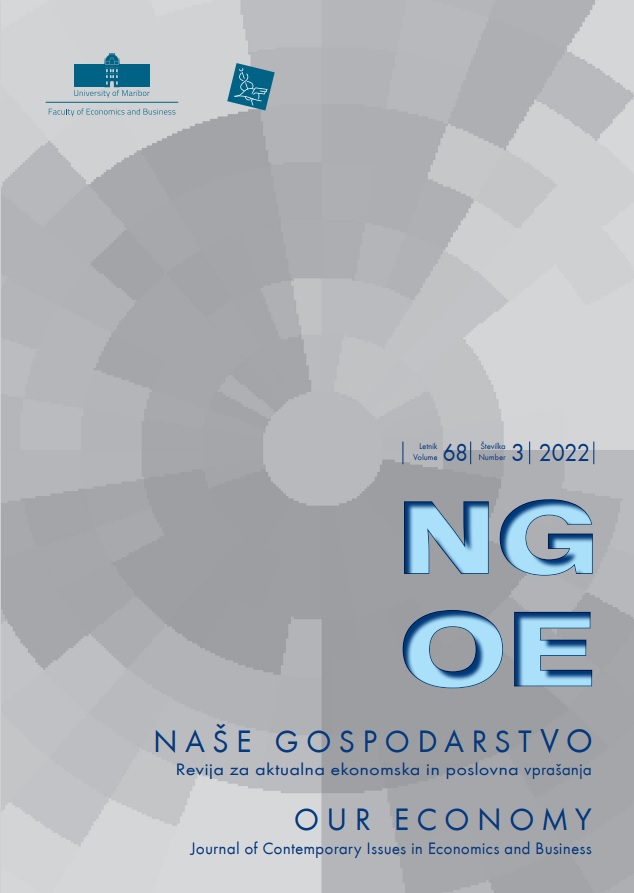Corporate Social Responsibility Considered With Two Systems Theories: A Case from Serbia
Keywords:
Corporate Social Responsibility, ISO 26000, Holistic Approach to CSR, Dialectical Systems Theory, System DynamicsAbstract
Corporate Social Responsibility (CSR) becomes one of the prerequisites for success of contemporary organizations aimed at humankind’s survival by sustainable development. As SR behavior can generate significant benefits, more and more organizations are developing SR strategic plans and implementing SR initiatives. In ISO 26000, CSR has three basic concepts: Responsibility for one's influences over society, interdependence and holistic approach. Therefore, authors focus on systemic approach to CSR. The purpose is to demonstrate how combined use of appropriate systems theories can help dealing with CSR. Accordingly, Dialectical Systems Theory (DST) and System Dynamics (SD), as relevant systems theories, i.e. methodologies stemming from different systemic paradigms, were selected. DST helped to identify some relevant aspects and components of CSR which were empirically tested in businesses in the Republic of Serbia. Hence, the following factors, i.e. groups of SR activities are selected as relevant for improving organizational performance: General CSR activities; CSR activities towards consumers; CSR activities towards environmental protection and beneficiaries’ health, and Socially responsible after sales activities. In addition, empirical research results indicating the influence of the above factors on performance were the basis for using the tools of SD, such as stock and flow diagrams and causal loop diagrams. SD tools contribute to simulating the system's future behavior, i.e. future performance level after improving these CSR activities. Authors introduce a new, systemic approach to conceptualizing and researching CSR by providing appropriate methodological support for exploring relevant interdependencies of CSR aspects.
Downloads
References
Bhattacharya, C. B., & Sen, S. (2004). Doing Better at Doing Good: When, Why, and How Consumers Respond to Corporate Social Initiatives. California Management Review, 47(1), 9–24. DOI: https://doi.org/10.2307/41166284
Chen, J., Liu, J. & Qin, J. (2019). Corporate social responsibility and capacity selection. Transformations in Business & Economics, 18, 3C(48C), 530–545.
Crifo, P., Diaye, M., & Pekovis, S. (2016). CSR related management practices and firm performance: An empirical analysis of the quantity–quality trade-of on French data. International Journal of Production Economics, 171(3), 405–441. DOI: https://doi.org/10.1016/j.ijpe.2014.12.019
De Bakker, F.G.A., Groenewegen, P., & Den Hond, F. (2005), A bibliometric analysis of 30 years of research and theory on corporate social Responsibility and corporate social performance. Business and Society, 44(3), 283-317. DOI: https://doi.org/10.1177/0007650305278086
European Commission (2011). A renewed EU strategy 2011-14 for Corporate Social Responsibility. Retrieved from http://ec.europa.eu/enterprise/policies/sustainable-business/corporate-social-responsibility/index_en.htm
Forrester, J. (1972). Industrial Dynamics. Cambridge, Massachusetts: The M.I.T. Press, Massachusetts Institute of Technology.
Golob, U. Johansen, T. S., Nielsen, A. E., & Podnar, K. (2014). Corporate Social Responsibility as a Messy Problem: Linking Systems and Sense-making Perspectives. Systemic Practice and Action Research, 27(4), 363-376. DOI: https://doi.org/10.1007/s11213-013-9287-7
Hair, J.F., Anderson, R.E., Tatham, R.L. & Black, W.C. (1995). Multivariate Data Analysis (3rd ed). New York: Macmillan. Homburg, C., Stierl, M., & Bornemann,T. (2013). Corporate Social Responsibility in Business to Business Markets: How Organizational Customers Account for Supplier Corporate Social Responsibility Engagement. Journal of Marketing, 77, 54-72. DOI: https://doi.org/10.1509/jm.12.0089
ISO (2010). ISO 26000:2010 ISO. Retrieved from www.iso.org/iso/social_responsibility.
Ivanović-Đukić, M. (2011). Promovisanje društveno odgovornog poslovanja preduzeća u Srbiji. Sociologija, 53(1), 21-42.
Jackson, M. C. (2003). Systems Thinking: Creative Holism for Managers. New York: John Wiley and Sons.
Maignan, I., & Ferrell, O.C. (2004). Corporate Social Responsibility and Marketing: An Integrative Framework. Journal of the Academy of Marketing Science, 32(1), 3-19. DOI: https://doi.org/10.1177/0092070303258971
Maon, F., Lindgreen, A., & Swaen, V. (2008). Thinking of the Organization as a System: The Role of Managerial Perceptions in Developing a Corporate Social Responsibility Strategic Agenda. Systems Research and Behavioral Science, 25, 413-426. DOI: https://doi.org/10.1002/sres.900
Mulej, M., Hrast, A., & Dyck, R. (2014). Social Responsibility – a new socio-economic order. Systems Research and Behavioral Science, 32(2), 147-264.
Mulej, M. (Ed.). (2013). Dialectical Systems Thinking and the Law of Requisite Holism concerning Innovation. Litchfield Park, AZ, USA: Emergent Publications.
Mulej, M., Ženko, Z., & Žakelj, V. (2017). Social Responsibility as a Next Step in development of Systemic Behavior toward Systems Solutions of Systemic Problems of Today. Journal of Systems Science and Systems Engineering, 26(3), 287-302. DOI: https://doi.org/10.1007/s11518-017-5333-9
Nikolić, J., & Zlatanović, D. (2018). Corporate governance and corporate social responsibility synergies: A systemic approach. Naše gospodarstvo/Our economy, 64(3), 36-46. DOI: https://doi.org/10.2478/ngoe-2018-0016
Orlitzky, M., Schmidt, F.L., & Rynes, S.L. (2003). Corporate social and financial performance: A meta-analysis. Organization Studies, 24(3), 403-441. DOI: https://doi.org/10.1177/0170840603024003910
Peloza, J., & Sang, J. (2011). How Can Corporate Social Responsibility Activities Create Value for Stakeholders? A Systematic Review. Journal of the Academy of Marketing Science, 39(1), 117-135. DOI: https://doi.org/10.1007/s11747-010-0213-6
Sharma, A., Iyer, G.R., Mehrotra, R., & Krishnan, R. (2010). Sustainability and business-to-business marketing: A framework and implications. Industrial Marketing Management, 39(2), 330-341. DOI: https://doi.org/10.1016/j.indmarman.2008.11.005
Štrukelj, T., Zlatanović, D., Nikolić, J., & Sternad-Zabukovšek, S. (2021). Viable System Model’s Support to Social Responsibility. Kybernetes, 50(3), 812-835. DOI: https://doi.org/10.1108/K-12-2019-0860
Torres, A., Bijmolt, T. H., Tribó, J.A., & Verhoef, P. (2012). Generating global brand equity through corporate social Responsibility to key stakeholders. International Journal оf Research in Marketing, 29(1), 13-24. DOI: https://doi.org/10.1016/j.ijresmar.2011.10.002
Vlachos, P.A, Tsamakos A., Vrechopoulos, A.P., & Avramidis, P.K. (2009). Corporate social Responsibility: attributions, loyalty, and the mediating role of trust. Journal of the Academy of Marketing Science, 37(2), 170-180. DOI: https://doi.org/10.1007/s11747-008-0117-x
Xueming, L., & Bhattacarya, C.B. (2006). Corporate Social Responsibility, Customer Satisfaction and Market Value. Journal of Marketing, 70(4), 1-18. DOI: https://doi.org/10.1509/jmkg.70.4.001
Yang, J., & Basile, K. (2019). The impact of corporate social Responsibility on brand equity. Marketing Intelligence & Planning, 37(1), 2–17. DOI: https://doi.org/10.1108/MIP-02-2018-0051
Zlatanović, D., & Mulej, M. (2015). Soft-systems approaches to knowledge-cum-values management as innovation drivers, Baltic Journal of Management, 10(4), 497-518. DOI: https://doi.org/10.1108/BJM-01-2015-0015
Zlatanović, D. (2012). System dynamics models in management problems solving. Economic Horizons, 14(1), 25-38.
Zlatanović, D. (2015). A Holistic Approach to Corporate Social Responsibility as a Prerequisite for Sustainable Development: Empirical Evidence, Economic Annals, 60(207): 69-94. DOI: https://doi.org/10.2298/EKA1507069Z
Zlatanović, D. (2017). A Multi-Methodological Approach to Complex Problem Solving: The Case of Serbian Enterprise. Systems, 5(2), 1-16. DOI: https://doi.org/10.3390/systems5020040
